苏轼代表作英译
苏轼诗词英译对比

苏轼诗词英译对比苏轼是中国古代文学史上一位杰出的诗人和文学评论家。
他的诗词作品广泛流传,深受后世文人的喜爱。
然而,苏轼的作品仅在中国传播,对于外国人来说,苏轼的诗词并不易于理解。
因此,英译对比成为了让外国人更好地欣赏苏轼诗词的途径。
英译对比是将苏轼的原诗进行翻译,并与中文原文进行对比,以便更好地传达苏轼的诗意。
这种对比可以帮助读者更好地理解苏轼的意境和情感。
以下是苏轼的《水调歌头》的中英译对比:明月几时有?把酒问青天。
不知天上宫阙,今夕是何年。
我欲乘风归去,又恐琼楼玉宇,高处不胜寒。
起舞弄清影,何似在人间。
英文翻译:When will the moon be bright and clear?I raise my cup and ask the sky.I don't know the palaces in the heavenly realms,What year is it tonight?I wish to ride the wind and return,But I fear the coldness of the jade halls,High above in the misty heights.Dancing and playing with my clear shadow,How can it compare to being in the human world?通过对比中英文翻译,我们可以看到英文翻译更加直观地表达了苏轼的意境。
英文翻译使用了更加形象的表述方式,让读者更容易想象苏轼所描绘的画面和情感。
然而,英译对比也存在一些挑战。
由于中英文的语言差异和文化背景的不同,翻译工作需要更多的细致琢磨和调整。
诗词的翻译不仅仅是对文字的转化,更重要的是要传达出原诗的意境和情感。
总之,苏轼的诗词英译对比为外国读者提供了更好地欣赏苏轼作品的途径。
通过对比中英文翻译,读者能更好地理解苏轼的作品背后所蕴含的情感和意义。
苏轼诗词全集带翻译
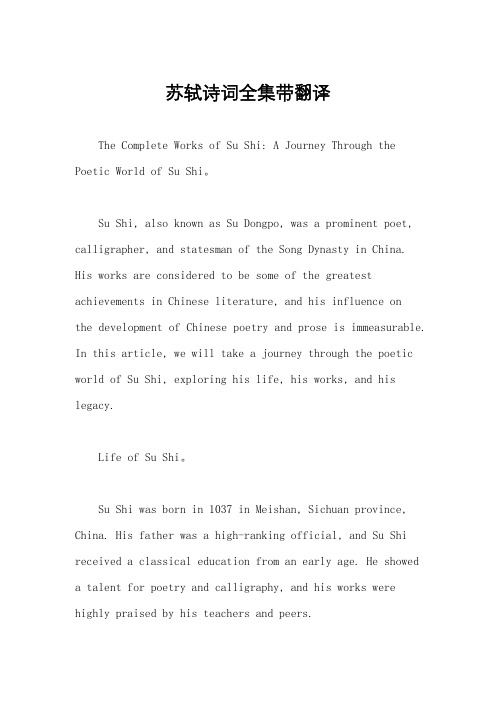
苏轼诗词全集带翻译The Complete Works of Su Shi: A Journey Through the Poetic World of Su Shi。
Su Shi, also known as Su Dongpo, was a prominent poet, calligrapher, and statesman of the Song Dynasty in China. His works are considered to be some of the greatest achievements in Chinese literature, and his influence onthe development of Chinese poetry and prose is immeasurable. In this article, we will take a journey through the poetic world of Su Shi, exploring his life, his works, and his legacy.Life of Su Shi。
Su Shi was born in 1037 in Meishan, Sichuan province, China. His father was a high-ranking official, and Su Shi received a classical education from an early age. He showed a talent for poetry and calligraphy, and his works were highly praised by his teachers and peers.In 1057, Su Shi passed the imperial examination and became a government official. He served in variouspositions throughout his career, including as a magistrate, a governor, and a minister of the state. However, his outspokenness and criticism of the government led to his exile on several occasions.During his exile, Su Shi continued to write poetry and prose, and his works became even more popular. He also became known for his calligraphy, and his style of writing is still admired today.Works of Su Shi。
【古诗英译】苏轼词选《水调歌头》中英对照
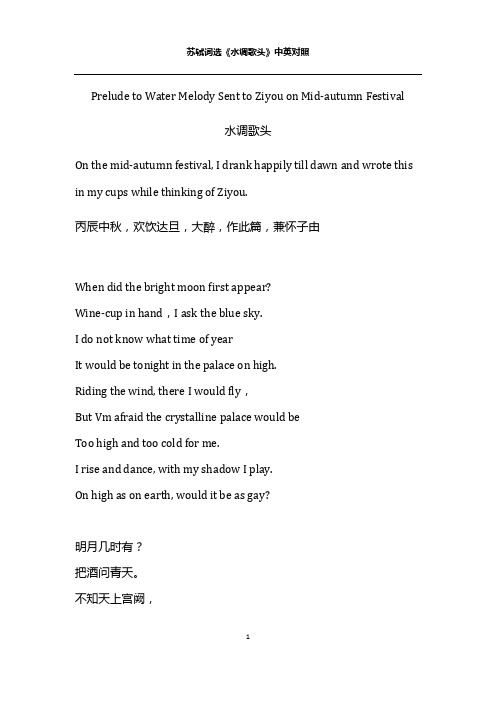
Prelude to Water Melody Sent to Ziyou on Mid-autumn Festival水调歌头On the mid-autumn festival, I drank happily till dawn and wrote this in my cups while thinking of Ziyou.丙辰中秋,欢饮达旦,大醉,作此篇,兼怀子由When did the bright moon first appear?Wine-cup in hand,I ask the blue sky.I do not know what time of yearIt would be tonight in the palace on high.Riding the wind, there I would fly,But Vm afraid the crystalline palace would beToo high and too cold for me.I rise and dance, with my shadow I play.On high as on earth, would it be as gay?明月几时有?把酒问青天。
不知天上宫阙,今夕是何年?我欲乘风归去,又恐琼楼玉宇,髙处不胜寒。
起舞弄清影,何似在人间?The moon goes round the mansions redWith gauze windows to shed Her light upon the sleepless bed. Against man she should not have any spite.Why then when people part is she oft full and bright?Men have sorrow and joy, they part and meet again;The moon may be bright or dim,she may wax or wane. There has been nothing perfect since olden days’So let us wish that man live as long as he can!Though miles apart, w e’ll share the beauty she displays’转朱阁,低绮户,照无眠。
定风波苏轼翻译及赏析

定风波苏轼翻译及赏析《定风波》是中国历史上一篇脍炙人口的名篇,由宋代著名文学家苏轼所作。
通过描写一场声势浩大的风雨,苏轼表达了自己对命运的控制以及对生命的热爱。
本文将从翻译和赏析两个方面深入分析这一著名的文学作品。
一、翻译《定风波》一半是描述景象,一半是表现思想,汉语语言中的符号和象声字对于传达美学意义至关重要,如何在翻译中准确地表达这些符号和意义是一个很大的难题。
下面是一段英文直译:The wind stops, and the clouds end. Clear stream flows and birds remain. Sadly the hills are green, but the moon doesn't appear. Night falls, but the autumn breeze is cold. From now on the poor have no way out until the Yellow River's water dries up.从对比中可以看出英译版本不仅没有准确表达作者的意图,反而更多强调了节奏和韵律,从而丧失了准确传达意义和具体细节的重要性。
最近几十年,翻译学家对这首诗进行了更加准确的翻译,如Zi -jung Lu 的翻译:The wind has stopped, the cloud has settled down;Under the clear stream, flowers are out in full swing;O, how green those hills are, from which no one ever looks back, And the moon is just sitting on the top of their peaks.二、赏析《定风波》是一首自然主义诗歌,在描绘自然现象的同时,充满了对生命和命运的探讨和热爱。
苏东坡《赤壁赋》的英文版来了
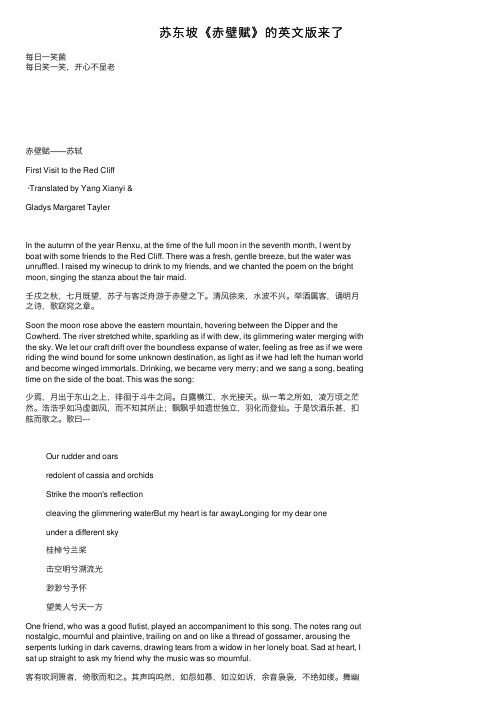
苏东坡《⾚壁赋》的英⽂版来了每⽇⼀笑菌每⽇笑⼀笑,开⼼不显⽼⾚壁赋——苏轼First Visit to the Red Cliff·Translated by Yang Xianyi &Gladys Margaret TaylerIn the autumn of the year Renxu, at the time of the full moon in the seventh month, I went by boat with some friends to the Red Cliff. There was a fresh, gentle breeze, but the water was unruffled. I raised my winecup to drink to my friends, and we chanted the poem on the bright moon, singing the stanza about the fair maid.壬戌之秋,七⽉既望,苏⼦与客泛⾈游于⾚壁之下。
清风徐来,⽔波不兴。
举酒属客,诵明⽉之诗,歌窈窕之章。
Soon the moon rose above the eastern mountain, hovering between the Dipper and the Cowherd. The river stretched white, sparkling as if with dew, its glimmering water merging with the sky. We let our craft drift over the boundless expanse of water, feeling as free as if we were riding the wind bound for some unknown destination, as light as if we had left the human world and become winged immortals. Drinking, we became very merry; and we sang a song, beating time on the side of the boat. This was the song:少焉,⽉出于东⼭之上,徘徊于⽃⽜之间。
苏轼《水调歌头》全诗英文版

苏轼《水调歌头》全诗英文版《水调歌头·明月几时有》苏轼代表作之一,其英文版如下:Mid-autumn of the Bing Chen year, having been drinking happily overnight, I'm drunk, so I write this poem for memorizing my brother, Zi You.Bright moon, when did you appear? Lifting my wine, I question the dark night sky. Tonight in the palaces and halls of heaven what year is it, I wonder? I would like to ride the wind, make my home there. Only I hide in a jade room of a beautiful mansion. As I could not bear the cold of high altitudes. So I rise and dance and play in your pure beams, this human world —how can it compare with yours?Circling red chambers, low in the curtained door, you shine on the sleepless. Surely you bear us no ill will —why then must you be so round at times when we humans are parted! People have their griefs and joys, their togetherness and separation. The moon has its dark and clear times, its waxings and wanings. Situations are neverideal since long ago. I only hope we two may have long long lives. So that we may share the moon's beauty even though we are a three hundred miles apart.补充资料:原文:《水调歌头·明月几时有》丙辰中秋,欢饮达旦,大醉,作此篇,兼怀子由。
苏轼诗词在西方的英译与出版
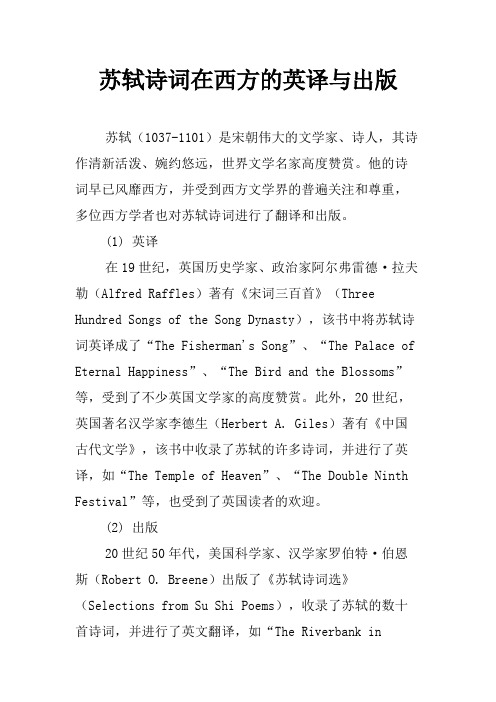
苏轼诗词在西方的英译与出版苏轼(1037-1101)是宋朝伟大的文学家、诗人,其诗作清新活泼、婉约悠远,世界文学名家高度赞赏。
他的诗词早已风靡西方,并受到西方文学界的普遍关注和尊重,多位西方学者也对苏轼诗词进行了翻译和出版。
(1) 英译在19世纪,英国历史学家、政治家阿尔弗雷德·拉夫勒(Alfred Raffles)著有《宋词三百首》(Three Hundred Songs of the Song Dynasty),该书中将苏轼诗词英译成了“The Fisherman's Song”、“The Palace of Eternal Happiness”、“The Bird and the Blossoms”等,受到了不少英国文学家的高度赞赏。
此外,20世纪,英国著名汉学家李德生(Herbert A. Giles)著有《中国古代文学》,该书中收录了苏轼的许多诗词,并进行了英译,如“The Temple of Heaven”、“The Double Ninth Festival”等,也受到了英国读者的欢迎。
(2) 出版20世纪50年代,美国科学家、汉学家罗伯特·伯恩斯(Robert O. Breene)出版了《苏轼诗词选》(Selections from Su Shi Poems),收录了苏轼的数十首诗词,并进行了英文翻译,如“The Riverbank inSpring”、“Farewell to Brother Wang”等,使苏轼诗词更加流传和受欢迎。
此外,20世纪70年代,美国知名汉学家马歇尔·阿瑟(Marshall A. Arthur)出版了《诗词与人生:苏轼文集》(Poetry and Life: The Collected Works of Su Shi),收录了苏轼的许多诗词,并进行了英文翻译,受到了广泛关注。
苏轼诗二首英译
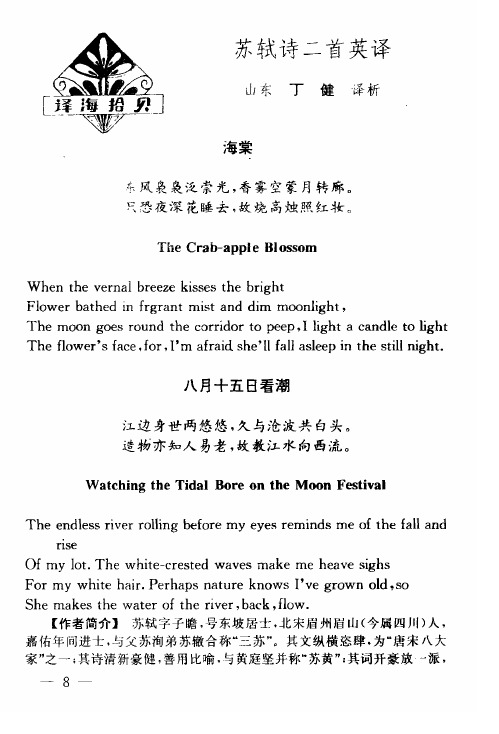
B o
r e
r e
o n
the
M0
0 n
F
s e
t iv
a
l
n
d le
s s
r
iv
e r
r o
ll in g b e f o
my
e
y
e s
r e
m in ds m e o f
t
h
e
fa l l
a n
d
r ls e
Of F
o r e
r
一 y
lo
t
.
T h it e
t
e
w hit e
一
e r e s a
t
n
,
F lo w
ba th e d
o o n
:n
s r
fr g
o u n
,
ra n t
mis
e
t
d d im m o
r s
l ig h
t
,
T he m Th
e
g
,
e o
5
d
,
t
h
’
e o r r a
id o id
t
o
’
p
e e a
p
1 lig h t
a s
a n
e
n a
h
e
d le
s
to
n
lg h i ig h
”
,
“
。
其 文 纵 横患 肆 为 唐 宋 八 大
“
,
“
家 之 一 其 诗 清 新 豪 健 善 用 比 喻 与黄 庭 坚 并 称 苏 黄
苏轼诗词英文
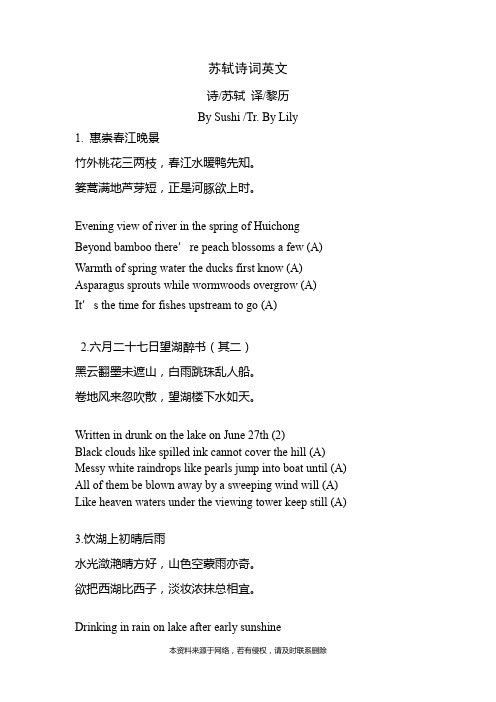
苏轼诗词英文诗/苏轼译/黎历By Sushi /Tr. By Lily1. 惠崇春江晚景竹外桃花三两枝,春江水暖鸭先知。
篓蒿满地芦芽短,正是河豚欲上时。
Evening view of river in the spring of Huichong Beyond bamboo there’re peach blossoms a few (A)Warmth of spring water the ducks first know (A) Asparagus sprouts while wormwoods overgrow (A)It’s the time for fishes upstream to go (A)2.六月二十七日望湖醉书(其二)黑云翻墨未遮山,白雨跳珠乱人船。
卷地风来忽吹散,望湖楼下水如天。
Written in drunk on the lake on June 27th (2)Black clouds like spilled ink cannot cover the hill (A) Messy white raindrops like pearls jump into boat until (A) All of them be blown away by a sweeping wind will (A) Like heaven waters under the viewing tower keep still (A)3.饮湖上初晴后雨水光潋滟晴方好,山色空蒙雨亦奇。
欲把西湖比西子,淡妆浓抹总相宜。
Drinking in rain on lake after early sunshineLake water is just glittering in sunshine (A)But rain lets charm of misty hills retain (B)Compared to Xizi*, lake view looks fine (A)No matter its dress is rich or plain (B)* Xizi, named Xishi,one of four beauties in ancient China. She lived in Yue Kingdom in the Spring and Autumn War Period.4. 题西林壁横看成岭侧成峰,远近高低各不同。
【古诗英译】苏轼词选《江城子密州出猎》中英对照
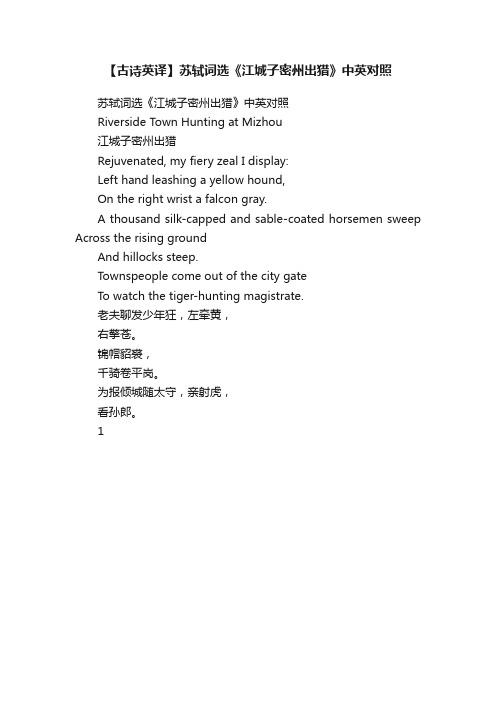
【古诗英译】苏轼词选《江城子密州出猎》中英对照
苏轼词选《江城子密州出猎》中英对照
Riverside Town Hunting at Mizhou
江城子密州出猎
Rejuvenated, my fiery zeal I display:
Left hand leashing a yellow hound,
On the right wrist a falcon gray.
A thousand silk-capped and sable-coated horsemen sweep Across the rising ground
And hillocks steep.
Townspeople come out of the city gistrate.
苏轼 定风波 英文
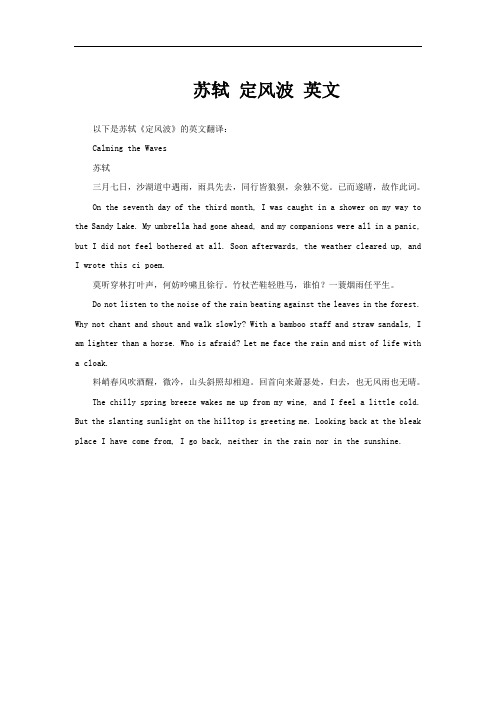
苏轼定风波英文以下是苏轼《定风波》的英文翻译:Calming the Waves苏轼三月七日,沙湖道中遇雨,雨具先去,同行皆狼狈,余独不觉。
已而遂晴,故作此词。
On the seventh day of the third month, I was caught in a shower on my way to the Sandy Lake. My umbrella had gone ahead, and my companions were all in a panic, but I did not feel bothered at all. Soon afterwards, the weather cleared up, and I wrote this ci poem.莫听穿林打叶声,何妨吟啸且徐行。
竹杖芒鞋轻胜马,谁怕?一蓑烟雨任平生。
Do not listen to the noise of the rain beating against the leaves in the forest. Why not chant and shout and walk slowly? With a bamboo staff and straw sandals, I am lighter than a horse. Who is afraid? Let me face the rain and mist of life with a cloak.料峭春风吹酒醒,微冷,山头斜照却相迎。
回首向来萧瑟处,归去,也无风雨也无晴。
The chilly spring breeze wakes me up from my wine, and I feel a little cold. But the slanting sunlight on the hilltop is greeting me. Looking back at the bleak place I have come from, I go back, neither in the rain nor in the sunshine.。
苏轼诗词英译版本

苏轼诗词英译版本
哎呀,你知道苏轼的诗词吗?那可是中华文化里的璀璨明珠啊!比
如说他的“但愿人长久,千里共婵娟”,多美的意境啊!
想象一下,把这样美妙的诗词翻译成英文,那得是多大的挑战!就
像要把一件精美的丝绸旗袍改成适合西方人的时尚礼服。
你想想,苏轼诗词里那种豪放洒脱,怎么能用英文准确传达?像“大江东去,浪淘尽,千古风流人物”,这磅礴的气势,英文能展现出
那种波澜壮阔吗?
我曾经看过一个英译版本,把“竹外桃花三两枝,春江水暖鸭先知”
翻译成了“Outside the bamboo grove, a few peach blossoms bloom. In the warm spring river, ducks know it first.” 这翻译,虽然意思差不多,可总
觉得少了点韵味,不是吗?
还有“欲把西湖比西子,淡妆浓抹总相宜”,英文翻译能把西湖的那
种灵动和美丽完全呈现出来吗?这就好比让一个外国人去理解咱们中
国水墨画的神韵,难啊!
我觉得吧,苏轼诗词的英译版本虽然在努力传达原意,但那种深深
扎根于中华文化的独特韵味,真不是那么容易就能完美展现的。
毕竟,有些东西,只属于咱们自己的文化土壤,不是吗?。
苏轼(题西林壁)英译
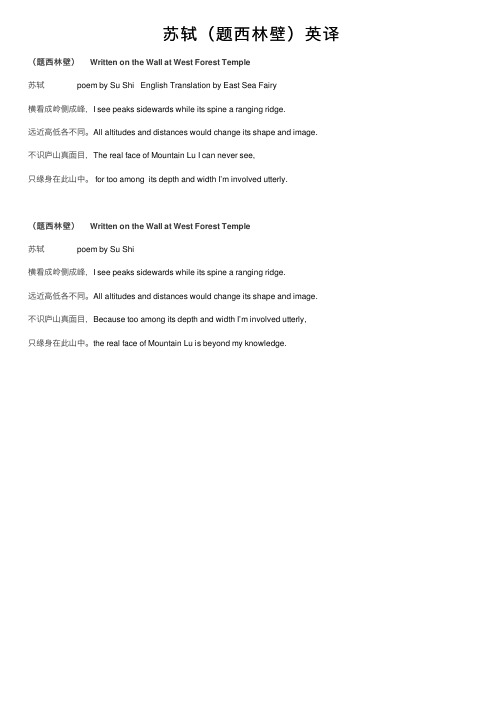
不识庐山真面目,Because too among its depth and width I’m involved utterly,
只缘身在此山中。the real face of Mountain Lu is beyond my knowledge.
远近高低各不同。All altitudes and distances would change its shape and image.
不识庐山真面目,The real face of Mountain Lu I can never see,
只缘身在此山中。 for too among its depth and width I’m involved utterly.
请您及时更换请请请您正在使用的模版将于2周后被下线请您及时更换
苏轼(题西林壁)英译
(题西林壁) Written on the Wall at West Forest Temple
苏轼Biblioteka poem by Su Shi English Translation by East Sea Fairy
横看成岭侧成峰,I see peaks sidewards while its spine a ranging ridge.
(题西林壁) Written on the Wall at West Forest Temple
苏轼
poem by Su Shi
横看成岭侧成峰,I see peaks sidewards while its spine a ranging ridge.
远近高低各不同。All altitudes and distances would change its shape and image.
★[经典咏流传]【宋·苏轼】《饮湖上初晴后雨》英译
![★[经典咏流传]【宋·苏轼】《饮湖上初晴后雨》英译](https://img.taocdn.com/s3/m/c2da4d48bf23482fb4daa58da0116c175f0e1e45.png)
★[经典咏流传]【宋·苏轼】《饮湖上初晴后⾬》英译六、《饮湖上初晴后⾬》其⼆【宋·苏轼】⽔光潋滟晴⽅好,⼭⾊空蒙⾬亦奇。
欲把西湖⽐西⼦,淡妆浓抹总相宜。
北京师范⼤学教授、博⼠⽣导师:康震⽩居易在先,做过杭州的刺吏,后来苏轼先是做杭州通判,就是相当于(现在的)副市长,后来⼜做了杭州市的市长。
这两个⼈对杭州的贡献都很⼤。
⽩居易和苏东坡到了杭州,⾸先⾯临着⼀个很⼤的问题,是什么呢?就是怎么治理西湖。
因为西湖是这样,它在当时古代,就是杭州市的⽔源⽤地,就是⼈们⽇常⽤⽔的这个地⽅。
但是如果⾥边⽔草过多,淤泥很多,那这个⽔源就很容易污染。
所以呢,他为什么要修这个堤呢?修这个堤,主要还不是为了让你上堤上去看春晓,⽽是为了把湖⾯过⼤,他把这个湖⾯做⼀个切割,这样⼦的话呢,就能有效地疏浚⾥边的这个湖⽔,⾥边的这个淤泥,那⽩堤是⽐较短的⼀道,限于⼯⼒、限于财⼒各⽅⾯的原因。
那后来苏轼来了以后呢,我们现在的那个苏堤实际上像贯穿⼀个直径⼀样,那么,苏堤上不是有很多的桥嘛,那个桥,就是从湖⾥边挖出来的淤泥甩上去的,所以苏轼治理这个西湖,它⾮常巧妙的是什么呢,它是⽤了⼀个建筑上⾯的美学的观念,来完成了⼀个⽣活上的美学的展现。
那你这个淤泥都挖出来,堆到哪⾥去呢?就变成了那些桥,然后我们⾛在那个苏堤的⼤道上。
所以呢,对于苏轼和⽩居易来讲,我感觉他们来到了杭州,感觉西湖就是杭州的眼睛,他们要让这个眼睛变得更加明亮,更加美丽、更加漂亮。
要不然为什么把西湖⽐做西⼦呢?因为西施在他们的⼼⽬当中,就是最漂亮最美丽的。
Drinking at the Lake First in Sunny and then in Rainy Weather饮湖上初晴后⾬许渊冲英译The brimming waves delight the eye on sunny days;⽔光潋滟晴⽅好,The dimming hills give a rare view in rainy haze.⼭⾊空濛⾬亦奇。
蝶恋花苏轼的英文翻译

蝶恋花苏轼的英文翻译蝶恋花苏轼的英文翻译《蝶恋花·花褪残红》是由北宋时期著名文学家苏轼任密州(今山东诸城)太守时所写的一首词作。
上片写伤春:触目红花纷谢,柳绵日少,青杏初结,普天芳草,充满了繁华易逝,“落花流水春去也”之意。
下片写伤情:借“多情却被无情恼”的意象,寓有对朝廷一片痴心却被贬官远谪的惆怅,含蓄地表达出作者仕途坎坷、飘泊天涯的失落心情。
下面和小编一起来看看吧!蝶恋花苏轼的`英文翻译花褪残红青杏小。
燕子飞时,绿水人家绕。
枝上柳绵吹又少,天涯何处无芳草!墙里秋千墙外道。
墙外行人,墙里佳人笑。
笑渐不闻声渐悄,多情却被无情恼。
Butterflies in Love with FlowersSu ShiRed flowers fade, green apricots appear still small,When swallows passOver blue water that surrounds the garden wall。
Most willow catkins have been blown away, alas!But there is no place where grows on sweet grass。
Without the wall there is a path, within a swing。
A passer—byHears a fair maiden's laughter in the garden ring。
The ringing laughter fades to silence by and by;For the enchantress the enchanted can only sigh。
蝶恋花赏析】《《蝶恋花·春景》》此作题一作“春景”。
上片写暮春自然风光。
从郊游少年的视角,由小到大,由近渐远地展开,极富层次感、色彩感和运动感。
“天涯何处无芳草”,既是对暮春景色拓开一景,又点化游春少年的惆怅,引发下片境界。
苏轼渔夫其四英译
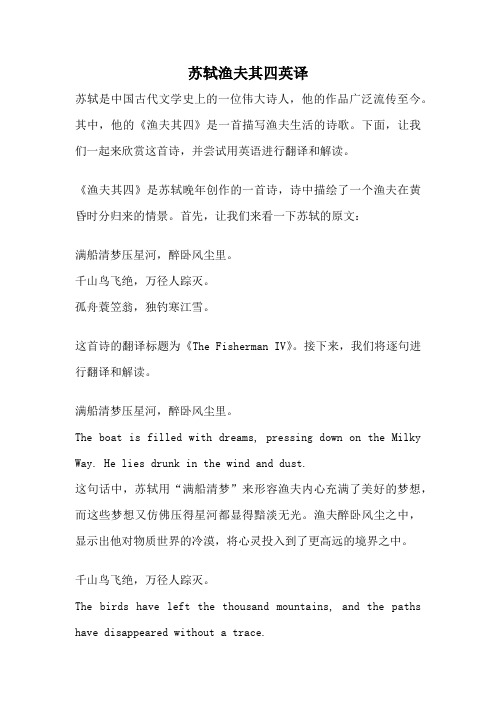
苏轼渔夫其四英译苏轼是中国古代文学史上的一位伟大诗人,他的作品广泛流传至今。
其中,他的《渔夫其四》是一首描写渔夫生活的诗歌。
下面,让我们一起来欣赏这首诗,并尝试用英语进行翻译和解读。
《渔夫其四》是苏轼晚年创作的一首诗,诗中描绘了一个渔夫在黄昏时分归来的情景。
首先,让我们来看一下苏轼的原文:满船清梦压星河,醉卧风尘里。
千山鸟飞绝,万径人踪灭。
孤舟蓑笠翁,独钓寒江雪。
这首诗的翻译标题为《The Fisherman IV》。
接下来,我们将逐句进行翻译和解读。
满船清梦压星河,醉卧风尘里。
The boat is filled with dreams, pressing down on the Milky Way. He lies drunk in the wind and dust.这句话中,苏轼用“满船清梦”来形容渔夫内心充满了美好的梦想,而这些梦想又仿佛压得星河都显得黯淡无光。
渔夫醉卧风尘之中,显示出他对物质世界的冷漠,将心灵投入到了更高远的境界之中。
千山鸟飞绝,万径人踪灭。
The birds have left the thousand mountains, and the paths have disappeared without a trace.这句诗中描述了大自然的宁静和人类的离去。
千山无鸟飞翔,万径没有人的踪迹,显示出渔夫所处的这个地方已经远离了凡尘世俗的纷扰,与世隔绝。
孤舟蓑笠翁,独钓寒江雪。
An old man in a lonely boat, fishing alone in the cold river covered with snow.通过这句诗,苏轼将渔夫形容成了一个孤独的老人,他独自一人坐在孤舟上,戴着斗笠,穿着蓑衣,漫不经心地钓着寒江中的鱼。
这里的“寒江雪”不仅仅是对天气的描绘,也可以理解为渔夫所处环境的寒冷和荒凉。
通过对这首诗的翻译和解读,我们可以感受到苏轼通过诗歌来表达对自然和人生的思考。
苏东坡的诗英文
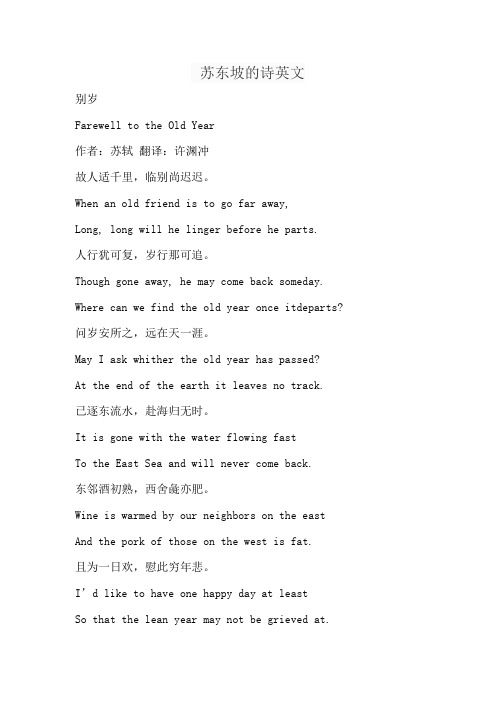
苏东坡的诗英文别岁Farewell to the Old Year作者:苏轼 翻译:许渊冲故人适千里,临别尚迟迟。
When an old friend is to go far away,Long, long will he linger before he parts.人行犹可复,岁行那可追。
Though gone away, he may come back someday. Where can we find the old year once itdeparts?问岁安所之,远在天一涯。
May I ask whither the old year has passed?At the end of the earth it leaves no track.已逐东流水,赴海归无时。
It is gone with the water flowing fastTo the East Sea and will never come back.东邻酒初熟,西舍彘亦肥。
Wine is warmed by our neighbors on the east And the pork of those on the west is fat.且为一日欢,慰此穷年悲。
I’d like to have one happy day at leastSo that the lean year may not be grieved at.勿嗟旧岁别,行与新岁辞。
Do not sigh for the departing old year!Soon we shall say goodbye to New Year’s Day.去去勿回顾,还君老与衰。
Do not look back but let them disappear.Man will grow old and his powers decay.。
- 1、下载文档前请自行甄别文档内容的完整性,平台不提供额外的编辑、内容补充、找答案等附加服务。
- 2、"仅部分预览"的文档,不可在线预览部分如存在完整性等问题,可反馈申请退款(可完整预览的文档不适用该条件!)。
- 3、如文档侵犯您的权益,请联系客服反馈,我们会尽快为您处理(人工客服工作时间:9:00-18:30)。
First Visit to the Red Cliff
Su Shi
In the autumn of the year Renxu, at the time of the full moon in the seventh month, I went by boat with some friends to the Red Cliff. There was a fresh, gentle breeze, but the water was unruffled. I raised my winecup to drink to my friends, and we chanted the poem on the bright moon, singing the stanza about the fair maid. Soon the moon rose above the eastern mountain, hovering between the Dipper and the Cowherd. The river stretched white, sparkling as if with dew, its glimmering water merging with the sky. We let our craft drift over the boundless expanse of water, feeling as free as if we were riding the wind bound for some unknown destination, as light as if we had left the human world and become winged immortals. Drinking, we became very merry; and we sang a song, beating time on the side of the boat. This was the song:
Ah, life is but like a dream;
With a cup of wine, let me yet pour a libation to the moon on the river.
(初大告 译)
3《定风波·莫听穿林打叶声》
三月七日沙湖道中遇雨。雨具先去,同行皆狼狈,余独不觉。已而遂晴,故作此。
莫听穿林打叶声,
何妨吟啸且徐行。
竹杖芒鞋轻胜马,
谁怕?
一蓑烟雨任平生。
料峭春风吹酒醒,
微冷,
山头斜照却相迎。
回首向来萧瑟处,
归去,
也无风雨也无晴。
Calming the Waves
Su Shi
Listen not to the rain beating against the trees.
苏子曰:“客亦知夫水与月乎?逝者如斯,而未尝往也;盈虚者如彼,而卒莫消长也。盖将自其变者而观之,则天地曾不能以一瞬;自其不变者而观之,则物与我皆无尽也,而又何羡乎?且夫天地之间,物各有主,苟非吾之所有,虽一毫而莫取。惟江之清风,与山间之明月,耳得之而为声,目遇之而成色;取之无禁,用之不竭。是造物者之无尽藏也,而吾与子之所共适。”
One friend, who was a good flutist, played an accompaniment to this song. The notes rang out nostalgic, mournful and plaintive, trailing on and on like a thread of gossamer, arousing the serpents lurking in dark caverns, drawing tears from a widow in her lonely boat. Sad at heart, I sat up straight to ask my friend why the music was so mournful.
The tumbling rocks thrust into the air;
The roaring surges dash upon the shore,
Rolling into a thousand drifts of snow.
The River and the mountains make a vivid picture—
1《水调歌头》
丙辰中秋,欢饮达旦,大醉,作此篇,兼怀子由。
明月几时有?
把酒问青天。
不知天上宫阙,
今夕是何年。
我欲乘风归去,
又恐琼楼玉宇,
高处不胜寒。
起舞弄清影,
何似在人间。
转朱阁,
低绮户,
照无眠。
不应有恨,
何事长向别时圆?
人有悲欢离合,
月有阴晴圆缺,
Our rudder and oars, redolent of cassia and orchids;
Strike the moon's reflection, cleaving the glimmering water;
But my heart is far away,
Longing for my dear one under a different sky.
Let me go back!
Impervious to wind, rain or shine, I’ll have my will.
4《前赤壁赋》
壬戌之秋,七月既望,苏子与客泛舟,游于赤壁之下。清风徐来,水波不兴。举酒属客,诵明月之诗,歌窈窕之章。少焉,月出于东山之上,徘徊于斗牛之间。白露横江,水光接天。纵一苇之所如,凌万顷之茫然。浩浩乎如冯虚御风,而不知其所止;飘飘乎如遗世独立,羽化而登仙。
What a host of heroes once were!
And I recall the young Lord then,
Newly married to the fair younger Qiao,
His valorous features shown forth;
With a feather fan and a silken cap
I rise and dance, with my shadow I play.
On high as on earth, would it be as gay?
The moon goes round the mansions red
Through gauze-draped window soft to shed
遥想公瑾当年,
小乔初嫁了,
雄姿英发。
羽扇纶巾,
谈笑间、
樯橹灰飞烟灭。
故国神游,
多情应笑我,
早生华发。
人生如梦,
一尊还酹江月。
Tune: “The Charms of Niannu”
Su Shi
The waves of the mighty river flowing eastward
The moon is bright or dim and she may wax or wane.
There has been nothing perfect since the olden days.
So let us wish that man
Will live long as he can!
Drunken, I’m sobered by vernal wind shrill
And rather chill.
In front I see the slanting sun atop the hill;
Turning my head, I see the dreary beaten track.
于是饮酒乐甚,扣舷而歌之。歌曰:“桂棹兮兰桨,击空明兮泝流光。渺渺兮予怀,望美人兮天一方。”客有吹洞箫者,倚歌而和之。其声呜呜然,如怨如慕,如泣如诉;余音嫋嫋,不绝如缕。舞幽壑之潜蛟,泣孤舟之嫠妇。
苏子愀然,正襟危坐而问客曰:“何为其然也?”客曰:“月明星稀,乌鹊南飞,此非曹孟德之诗乎?西望夏口,东望武昌,山川相缪,郁乎苍苍,此非孟德之困于周郎者乎?方其破荆州,下江陵,顺流而东也,舳舻千里,旌旗蔽空,酾酒临江,横槊赋诗,固一世之雄也,而今安在哉?况吾与子渔樵于江渚之上,侣鱼鰕而友麋鹿,驾一叶之扁舟,举匏樽以相属。寄蜉蝣于天地,渺沧海之一粟。哀吾生之须臾,羡长江之无穷。挟飞仙以遨游,抱明月而长终。知不可乎骤得,托遗响于悲风。”
Though miles apart, we’ll share the beauty she displays.
(许渊冲、许明 译)
2《念奴娇·赤壁怀古》
大江东去,
浪淘尽,
千古风流人物。
故垒西边,
人道是、
三国周郎赤壁。
乱石穿空,
惊涛拍岸,
卷起千堆雪。
江山如画,
一时多少豪杰!
此事古难全。
但愿人长久,
千里共婵娟。
Prelude to Water Melody
Su Shi
How long will the full moon appear?
Wine cup in hand, I ask the sky.
I do not know what time of the year
Amid talking and laughing he put his enemy’s ships to ashes and smoke.
